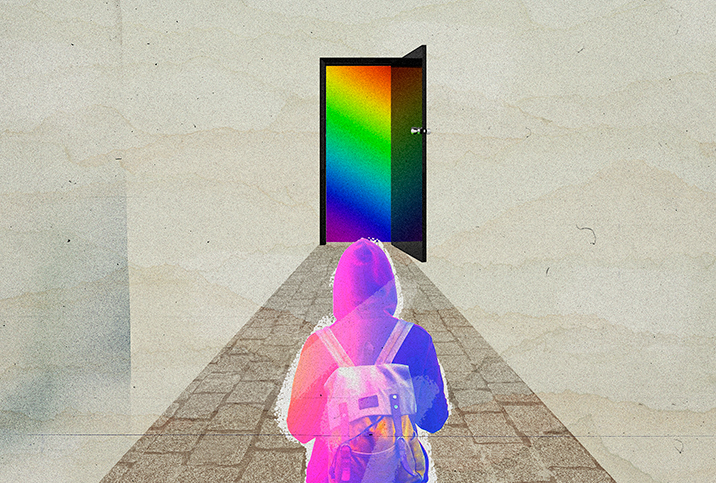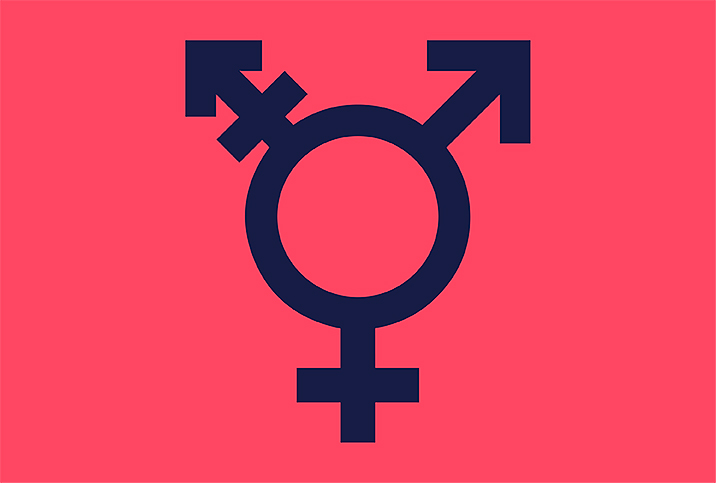Am I Gayer Now That I've Transitioned?

I had the experience of being a tomboy growing up and was comfortable in how I existed in the world (as far as I remember), but everything changed with puberty.
I didn't fit into people's expectations of me, and my body didn't fit into what I felt a woman should look like. I tried really hard to be a "good woman" because I was attracted to men and I thought that's what was expected of me. I'm fairly confident I was experiencing gender dysphoria, but I didn't have the language then to describe or understand the feeling. While gender and sexuality are independent of each other, my sexuality impacted my ability to explore and uncover my gender.
In my early 20s, I began learning more about queer identities and met people in the LGBTQIA+ community. I quickly came to the realization I'm not straight. But what does it mean to not be straight if I am attracted to men?
This question is something I wrestled with for a long time, though not in those exact terms. Internally, I had determined I felt queer or gay but didn't understand what that meant.
The first time I came out was as bisexual, and I started exploring my sexuality before unpacking my gender identity. J. Matsui De Roo, a registered clinical counselor in Vancouver, British Columbia, said this type of sexual exploration, before investigating gender, is fairly common among their clients.
Eventually, I discovered I could be transgender and still be attracted to men. This seemed like common sense because, of course, you can. However, in the moment, this realization felt like a revelation to me and allowed me to explore and accept my gender, and eventually, pursue medical transition.
The question of whether I'm "gayer" now that I've transitioned arose when I realized I was less attracted to women than previously thought. But it's not that simple.
For instance, I am polyamorous and a person who has a lot of love for people. I appreciate that polyamory and queerness let me redefine what relationships look like and allowed for closeness and intimacy in all sorts of relationships, not strictly romantic ones. I mention this because, in exploring my sexuality following my transition, I realized I love cute, queer platonic relationships and intimacy with all sorts of people, but am exclusively interested in sex with men.
Does this make me gayer? Maybe.
Sometimes our sexuality may not change per se, but the way we feel about it or the language we use to describe it does.
Is it common for sexuality to change after transition?
Several studies suggest changes in sexuality among trans people are common. German and American studies reported a shift in sexual orientation following social transition, and U.S. studies for both trans men and trans women indicate similar results following medical transition (hormones and/or surgery).
An interesting note from these studies is that most changes in sexuality were an opening up of sexual attraction rather than a reversal of attraction. This means people exclusively attracted to one gender pre-transition experienced a shift to an attraction to more than one gender after transition. It should be noted that these studies asked only about attraction to men and women. I would love to see more research on this topic that includes nonbinary identities.
While it is common for sexuality to change for trans folks following transition, is it more common than among cisgender folks?
Studies have shown sexuality fluctuates for people even into adulthood. While changes are typically marginal in this research, it does seem more common for sexuality to fluctuate for folks who are not "100 percent" heterosexual.
In reality, a person's sexuality can vary regardless of gender, and it's common to see sexuality oscillate for cisgender people, too. But several factors could contribute to this change for transgender folks.
Gender affirmation
Feeling comfortable in your gender and, in some cases, being perceived as such can give a person the confidence and space to explore their sexuality or engage in sex that feels comfortable to them.
"Some people experience relief at no longer having to present as the gender they are not, and social or medical transition gives them more space to let old gender roles go, which can include no longer having kinds of sex that aren't congruent with their identity," De Roo said. "This can look like exploring different kinds of sex with different partners or choosing not to have sex."
Comfort in your body
As a person begins to feel more comfortable in their body, it allows them to feel more comfortable and safer to explore their body and let others explore it. While this is similar to feeling comfortable in one's gender, there are physical changes associated with transition that can aid in making sexual interactions comfortable and exciting.
Brett Mason, a registered social worker and member of the LGBTQIA+ community in Canada, noted, "after medically transitioning…many trans people are more comfortable with their bodies, which can result in being comfortable with being sexual in ways they had not previously been. This might [mean] being attracted to more or other genders than before transition; this might also be being more open to kink, open relationships or self-discoveries about being asexual or demisexual."
Knowledge of sex
Mason noted trans people's increased comfort with sex and sexual exploration might also occur through interacting with the queer community and gaining knowledge of all the ways people can be sexual together.
This insight may be the result of being perceived as your affirmed gender, which allows trans folks to enter spaces they couldn't previously access, and this gives them more space for sexual exploration, De Roo noted.
Why did my sexuality change?
In the beginning, I was attempting to work out whether I was nonbinary or a trans man, and trying to determine my goals for my transition. At that time, it felt as if my relationships were queer because I was more gender-ambiguous or androgynous. This feeling continued for the first few years I was on hormones because I was still misgendered regularly and continued to have a fairly androgynous look.
Overall, I feel more confident today in what my queerness looks like and have a better understanding of the nuances of my queer identity. Sexual exploration has helped me understand myself. While I tend to gravitate toward men, my identity and openness allow for the opportunity for people to surprise me.
We can't say for sure how sexuality is impacted by transition or how a person's sexuality may change because of transition. However, it does seem as though exploration of gender and sexuality goes hand in hand, so give yourself permission to explore. It's OK for attraction to change over time. Embrace it.


















